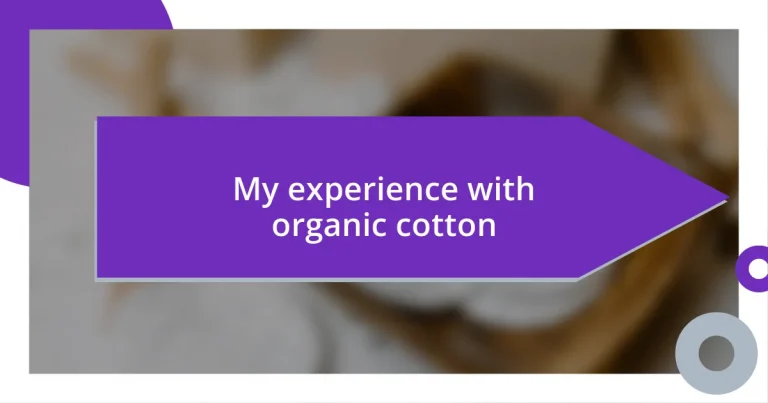Key takeaways:
- The author’s journey with organic cotton began with a discovery of its softness and sustainable benefits, leading to a commitment to healthier lifestyle choices.
- Choosing organic cotton not only has positive effects on personal health (e.g., reduced skin sensitivities) but also significantly decreases environmental harm compared to conventional cotton farming.
- Caring for organic cotton products involves simple practices like washing in cold water and using eco-friendly detergents, which enhances product longevity while supporting sustainability.
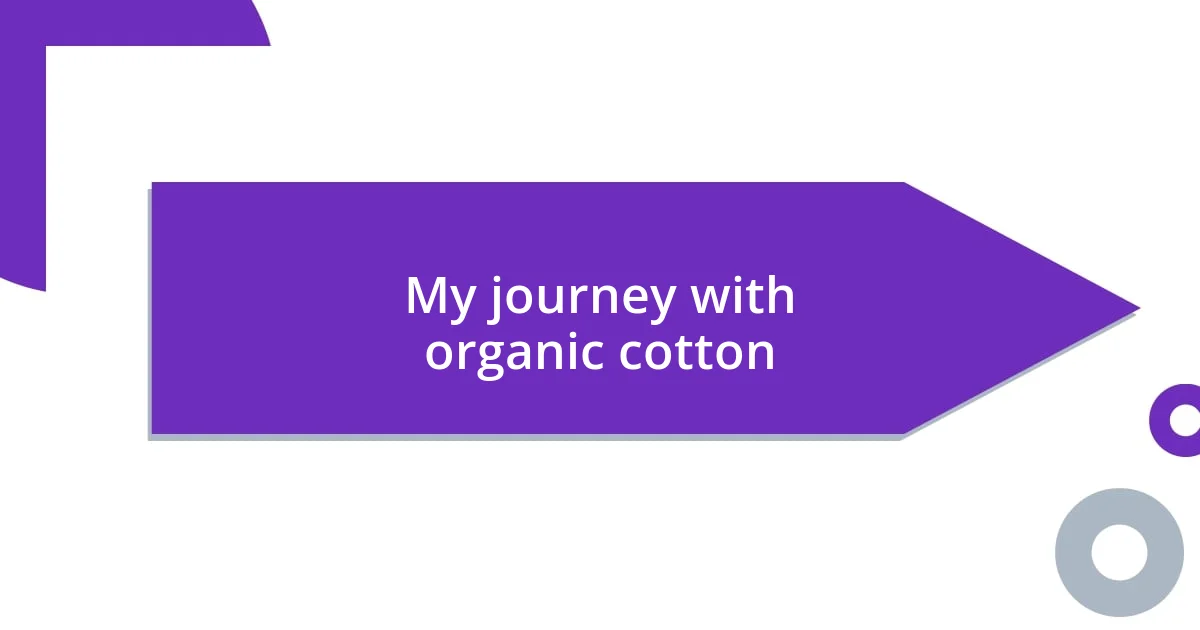
My journey with organic cotton
My journey with organic cotton began quite unexpectedly during a visit to a local eco-friendly store. I picked up a soft, organic cotton blanket that instantly felt warm and inviting in my hands, and I couldn’t help but wonder—what made it different from regular cotton? As I learned more about its benefits, I discovered it’s grown without harmful pesticides, and I felt a deep connection knowing my purchase supported sustainable practices.
One particularly memorable moment was when I chose organic cotton sheets for my bedroom. The first night I slept on them, I was struck by how cozy and breathable they felt. I remember thinking, “This is what I’ve been missing all along.” That little change not only improved my sleep but also gave me peace of mind knowing I was making a healthier choice for myself and the planet.
Over time, I started integrating more organic cotton products into my life, from bags to clothing. It felt empowering to support a more sustainable lifestyle. Have you ever felt that rush of excitement when you realize your choices can contribute to something bigger? My journey with organic cotton has been about more than just fabric; it’s been a commitment to a healthier lifestyle and a more sustainable future.
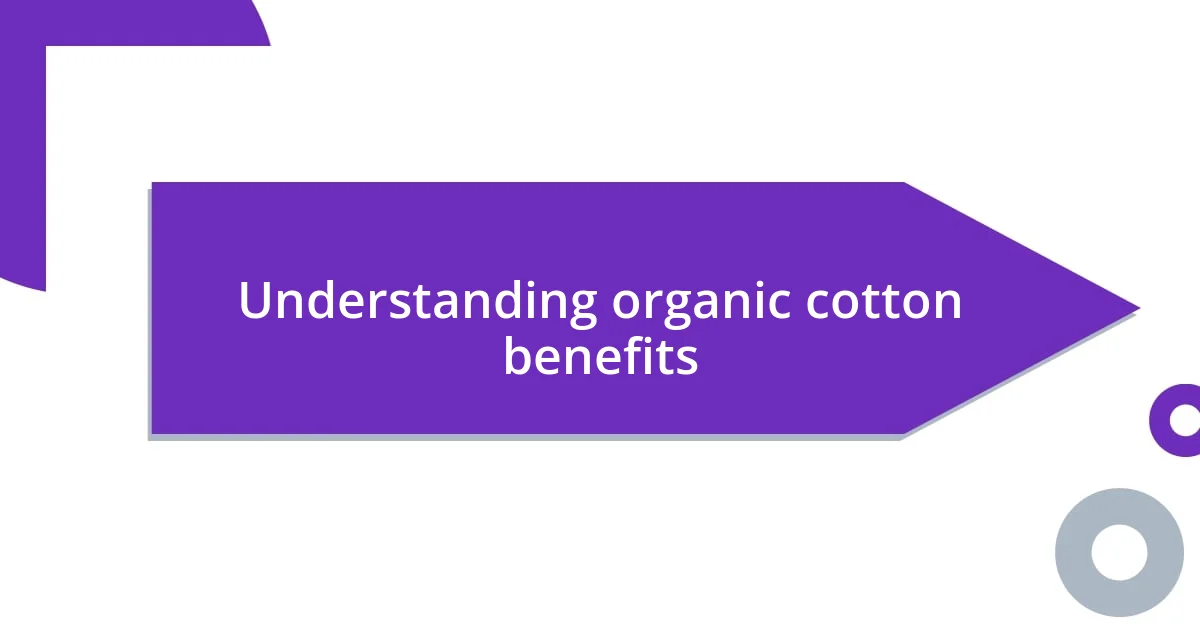
Understanding organic cotton benefits
Understanding the benefits of organic cotton is quite enlightening. From my experience, this type of cotton not only feels luxurious against the skin but also gives me peace of mind. I remember when I bought my first organic cotton T-shirt; the softness was like nothing I had ever felt before, and knowing it was produced without chemicals made me feel good about my purchase.
Moreover, the environmental impact of choosing organic cotton is significant. Conventional cotton farming uses a staggering amount of pesticides and synthetic fertilizers, which can harm soil and water quality. When I chose organic cotton, it felt like I was making a small yet impactful contribution to reducing this harm. I couldn’t help but share this revelation with my friends, hoping they’d feel inspired to make similar choices.
In addition to being gentle on the planet, organic cotton is also kinder to our skin. For those with sensitivities, like myself, it’s almost a game-changer. The reaction I used to get from regular cotton vanished entirely once I switched to organic. It’s incredible how our choices can affect our health and well-being in such profound ways.
| Conventional Cotton | Organic Cotton |
|---|---|
| Uses harmful pesticides and fertilizers | Grown without synthetic chemicals |
| Can irritate sensitive skin | Gentle and hypoallergenic |
| Higher environmental impact | Sustainably farmed, better for the ecosystem |
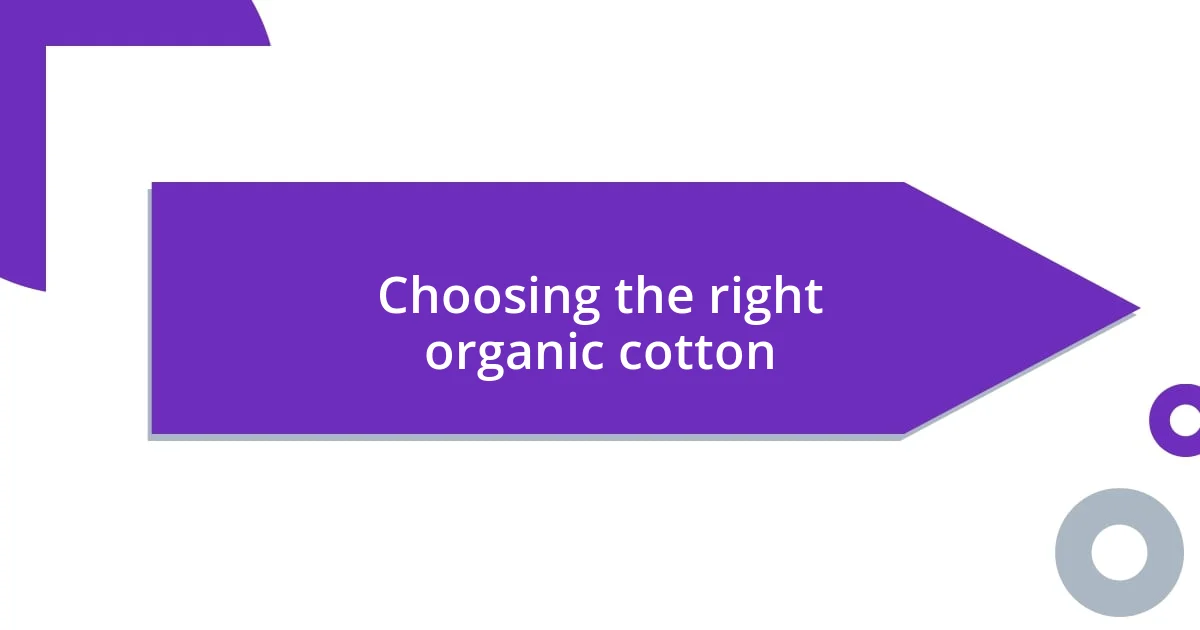
Choosing the right organic cotton
Choosing the right organic cotton can sometimes feel overwhelming, but it really comes down to knowing what you value most. When I first started my journey, I primarily focused on comfort, but as I explored further, I discovered the importance of certifications. Organic labels like GOTS (Global Organic Textile Standard) ensure that the cotton is not only organic but also meets strict environmental and social criteria.
Here are a few key factors I consider when selecting organic cotton products:
- Certification: Look for reputable certifications like GOTS to ensure ethical practices.
- Softness: Always feel the fabric; organic cotton can be incredibly soft compared to conventional cotton.
- Dyeing Process: Opt for products dyed with natural, non-toxic dyes to ensure a healthier choice for your skin.
- Source Transparency: Brands that share information about their sourcing often demonstrate a commitment to sustainability.
Whether it’s a cozy throw or a set of sheets, understanding these elements has truly enhanced my shopping experience. It feels so rewarding to know I’m making choices that reflect my values and positively impact the environment. When I finally invested in organic cotton towels, the luxurious feel made me realize just how much I had been missing out on, both in comfort and in meaningful living.
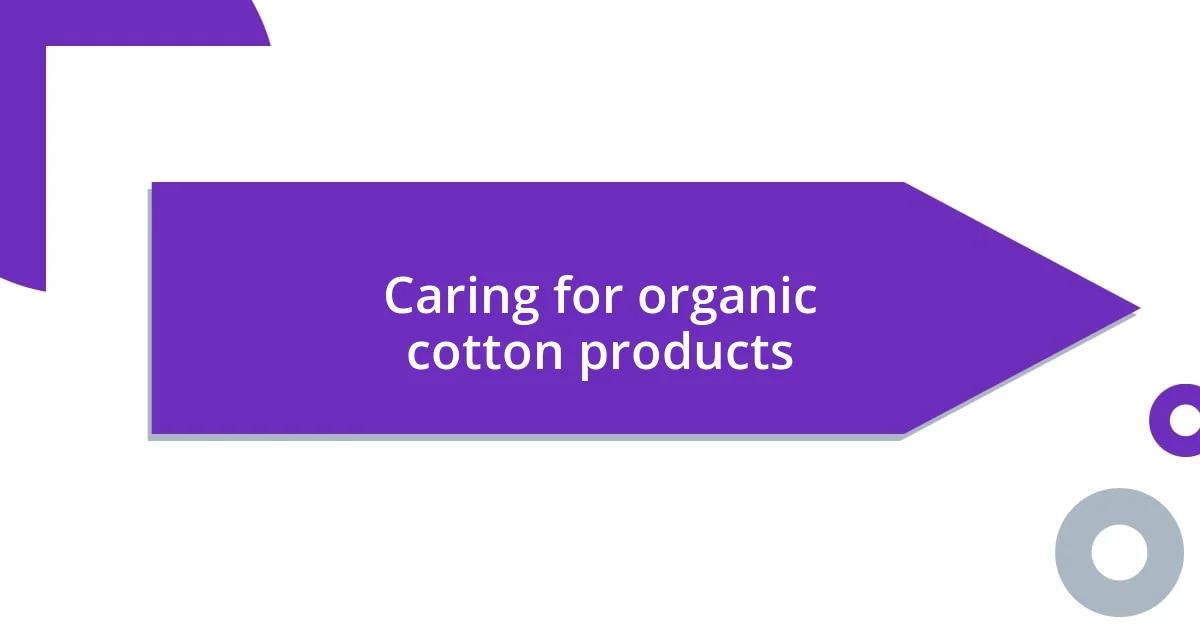
Caring for organic cotton products
Caring for organic cotton products is simpler and more rewarding than you might think. I remember the first time I washed my organic cotton sheets; I was a bit apprehensive, worrying about shrinking or losing that divine softness. To my delight, they held up beautifully! I quickly learned that washing in cold water and air drying not only preserved their quality but also helped reduce my energy consumption.
Another essential tip is to avoid harsh detergents. I found that using a mild, eco-friendly detergent was a game-changer. Not only did it keep my fabrics in great shape, but it also aligned with my commitment to a more sustainable lifestyle. Have you ever noticed how chemical-laden products can have a lingering smell? Switching to gentler options made my laundry experience feel fresher and safer.
Lastly, proper storage is key! Folding and storing my organic cotton items in a cool, dry place has made a notable difference. It’s so easy to forget storage methods, but I’ve seen how it prevents unnecessary wear and tear. By treating these products with care, I feel like I’m not just prolonging their life but also honoring the sustainable choices I made when purchasing them. It’s a small effort for something that brings me such joy!
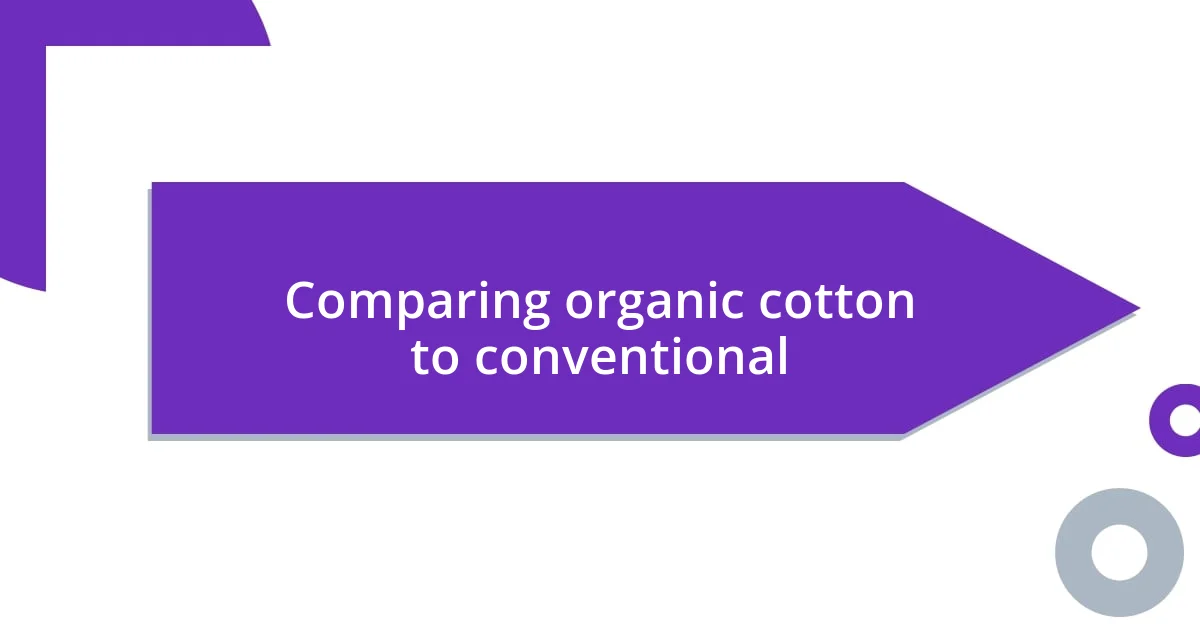
Comparing organic cotton to conventional
When I first tried organic cotton, the difference from conventional cotton was striking. I remember wrapping myself in an organic cotton blanket and feeling a level of softness that made me question what I’d been using before. It’s not just about feel; organic cotton is cultivated without synthetic pesticides and fertilizers, which means I can relax knowing my health isn’t jeopardized by harsh chemicals. How amazing is that?
In my experience, organic cotton often outlasts conventional varieties. I still have a favorite organic cotton shirt that I’ve worn for years, and it’s just as comfy as when I first bought it. On the other hand, some conventional cotton items I purchased around the same time have already faded or developed that dreaded fabric pilling. Isn’t it remarkable to think about how investing in organic options isn’t just a trend but a step toward durable quality?
I’ve also noticed a significant impact on the environment when opting for organic. With conventional cotton farming consuming about 25% of the world’s insecticides, the thought of contributing to such pollution weighs heavily on my conscience. Each time I choose organic, I feel part of something much larger — a push toward a healthier planet. It’s empowering to think that if more people realized these benefits, perhaps we could collectively shift the industry for good. Doesn’t that make you want to consider what’s in your closet too?
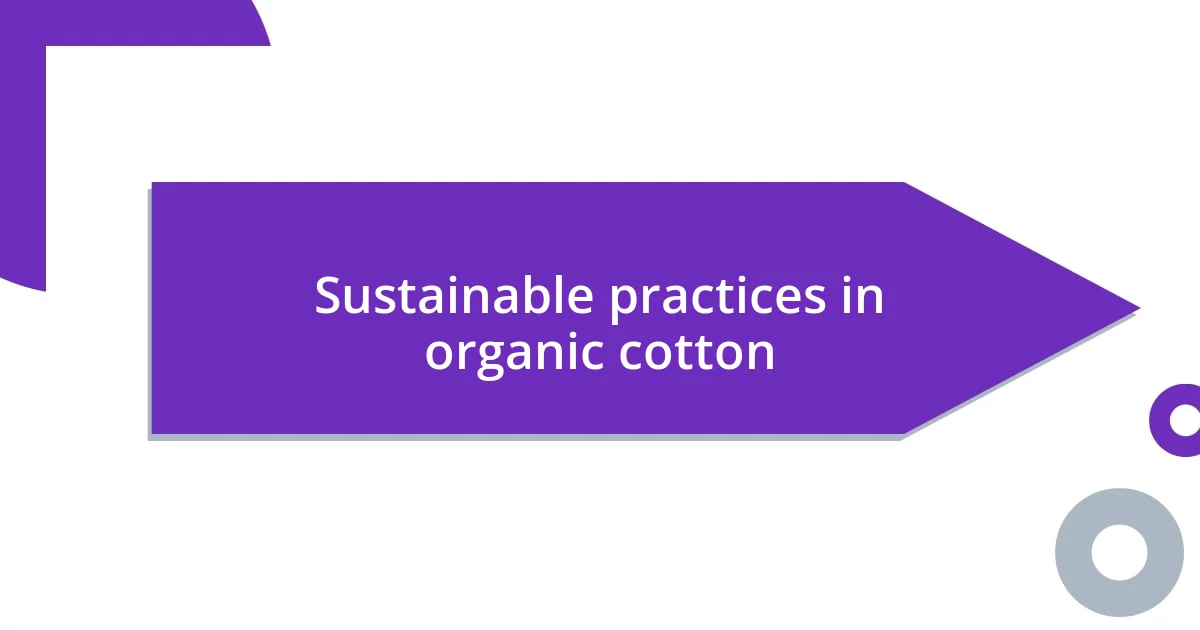
Sustainable practices in organic cotton
Sustainable practices in organic cotton not only support the environment but also foster a deeper connection to our clothing choices. I remember the first time I saw the certification labels on my organic cotton garments — it felt like I was making a conscious stand against unsustainable practices. Knowing that these textiles are grown without harmful chemicals is incredibly reassuring. It’s like wearing a badge of honor that says I care about the planet. Have you ever felt that sense of pride in your clothing?
One remarkable aspect of organic cotton farming is its reliance on natural methods to manage pests and nourish the soil. I recall visiting a local farm where organic cotton was grown, and seeing beneficial insects like ladybugs in action was eye-opening. It struck me how nature has its own ways of balancing ecosystems without our interference—how refreshing is that? Embracing such sustainable farming techniques not only protects our health but also nurtures biodiversity, which is crucial for our planet’s future.
The journey to sustainable organic cotton also extends to its production processes. Whenever I wear my organic cotton clothes, I feel a sense of calm, knowing that the workers involved are treated fairly. Fair Trade practices often accompany organic farming, ensuring artisans receive decent wages. It’s a powerful reminder that every piece I buy is interconnected with real people and their lives. Doesn’t that give a whole new meaning to the term “slow fashion”?












